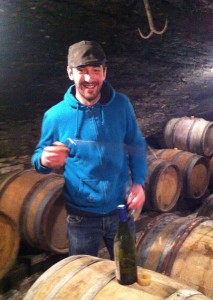Julien Altaber was not born Burgundian nor did he inherit vines, as most of Burgundy’s successful vignerons have. Raised in Auvergne, he hoped to continue the family tradition of dairy farming. But after insistence from his mother, he enrolled in trade school to study viticulture, setting his life on an unexpected path. His mother may have imagined her son at work for a lucrative Cote D’Or domaine where men in suits line up to purchase Pinot “futures,” but Julien always wanted to work for himself, in his own vines. Despite its idyllic appearance, the political economy of Burgundy is increasingly similar to Bordeaux or Napa, with serious barriers to entry for young vignerons with big ideas and small pockets. This is the landscape that Julien confronted after trade school: record-high cost of land and not a lot of friendly faces.
Around that time, he made the acquaintance of Dominique Derain in Saint Aubin, a pioneer of organic viticulture and natural winemaking in Burgundy and an all around charitable fellow. Dominique had always been a black sheep in the conservative world of the Cote D’Or and he found something familiar in Julien’s idealism. The two struck a deal. Julien would work as Dominique’s cellar assistant and help him tend the vines and Dominique would allow Julien to make a few barrels of wine in the basement. In the meanwhile, Dominique would help Julien find interesting and affordable parcels to purchase. In 2011, Julien found what he was looking for: an exceptional old-vines parcel of uncloned Aligoté vines, close to the village of Puligny, one of the great terroirs of the Cotes de Beaune. The following year, he arranged a fermage, a long-term lease on a parcel of pinot noir high up in the hills of the relatively obscure Maranges AOC, from which he vinifies approximately two barrels per year. And in the mean while, Julien has established hands-on relationships with a small circle of growers in and around Saint Aubin and in the Cote Chalonaise, from whom he buys fruit for negoce cuvees. Here, a few words about sourcing are necessary. In the smoke-and-mirrors world of Burgundy negociants, Julien’s work is totally transparent. He demands organic farming without exception and prefers recurring relationships to one-off deals. His Bourgogne Blanc, for instance, has been sourced from Vincent Talmot’s lovely organic vineyard at Montbellet for the last 5 years and his Puligny-Montrachet is purchased from Renaud Boyer, a long-time friend and a notable natural winemaker in his own right.
There’s a subtlety in these Burgundies that bears an obvious resemblance to Julien’s mentor, Dominique Derain. At the same time, though, there’s an incredible energy and liveliness that results from Julien’s gentle, hands-off cellar work. He believes that Burgundies are at their best without chaptalization, even if nature gives him a mere 11% alcohol, as is often the case in Maranages. Fermentation is always spontaneous and sulfur is usually avoided entirely. Finally, the wines are left unfiltered to showcase the aromatic complexity of Julien’s unique terroirs.

